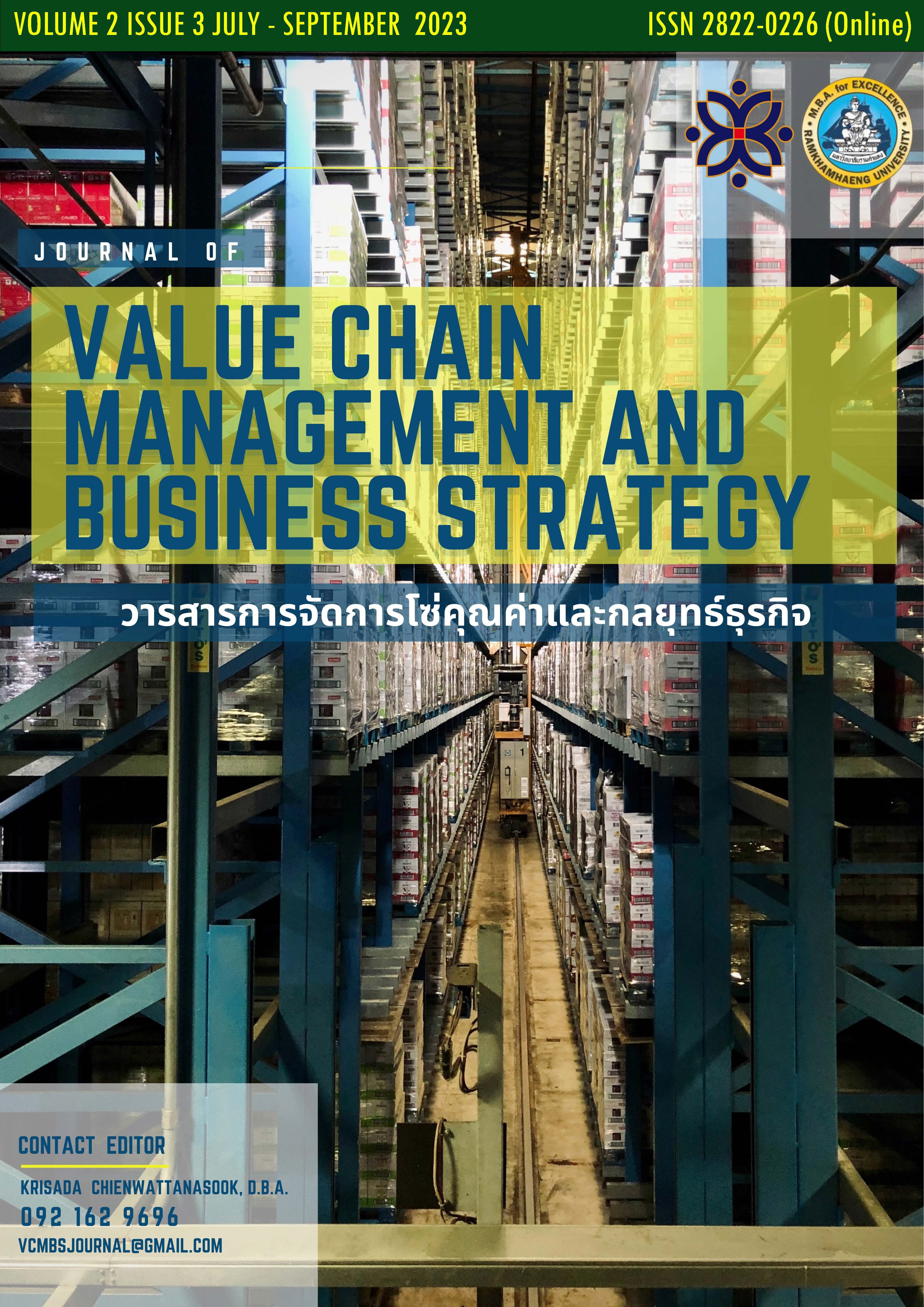ORGANIZATIONAL CLIMATE AND WORK MOTIVATION AFFECTING ORGANIZATIONAL ENGAGEMENT OF EMPLOYEES AT A FITNESS BRAND IN THAILAND
Keywords:
Organizational Climate, Work Motivation, Organization Commitment, FitnessAbstract
This research aims to investigate the organizational climate, motivational factors, and hygiene factors that influence the organizational commitment of employee in a fitness brand organization in Thailand. The research population and sample for this study consisted of operational-level employees of a specific fitness brand in Thailand, totaling 214 individuals, selected through non-probability convenient sampling. Data were collected through questionnaires and analyzed using descriptive statistics, mean values, standard deviations, and tested hypotheses through multiple regression analysis.
The research findings reveal that the organizational climate, specifically aspects related to rewards and a warm atmosphere, significantly impact organizational commitment of employee in a fitness brand organization in Thailand, with statistical significance at the .05 level and a predictive power of 41.0%. Motivational factors, particularly development opportunities, also have a significant influence on organizational commitment of employee in a fitness brand organization in Thailand, with statistical significance at the .05 level and a predictive power of 19.0%. Additionally, hygiene factors such as supervision, salary, and status have a significant impact on organizational commitment of employee in a fitness brand organization in Thailand, with statistical significance at the .05 level and a predictive power of 43.1%.
References
กนกพร กระจางแสง และวิโรจน์ เจษฎาลักษณ์. (2560). อิทธิพลของแรงจูงใจการทำงานและการสนับสนุนจากองค์กรที่ส่งผลต่อคุณภาพในการปฏิบัติงานผ่านความผูกพันต่อองค์กรของบุคลากรโรงพยาบาลนครธน. วารสารวิชาการมหาวิทยาลัยธนบุรี, 11(26), 116-129.
กรี ศรีจารุเมธีญาณ และสุรศักดิ์ อุดเมืองเพีย. (2563). แรงจูงใจในการทำงาน: ทฤษฎีและการประยุกต์ใช้. วารสาร มจร อุบลปริทรรศน์, 5(1), 424-436.
กฤตภาคิน มิ่งโสภา และกฤษดา เชียรวัฒนสุข. (2565). ความผูกพันในงานของบุคลากรทางการศึกษาในสถานบันอุดมศึกษาภาคเอกไทย. วารสารวิชาการการตลาดและการจัดการ มหาวิทยาลัยเทคโนโลยีราชมงคลธัญบุรี, 9(1), 1-18.
กฤษดา ตั้งชัยศักดิ์ และณรัฐ วัฒนพานิช. (2563). ทัศนคติที่มีต่อการออกกำลังกายและรูปแบบการให้บริการที่คาดหวังจากสถานออกกำลังกาย (Finess center) ของคนวัยทำงานในเขตกรุงเทพมหานคร. วารสารวิชาการ สถานบันเทคโนโลยีแห่งสุวรรณภูมิ, 6(2), 369-387.
กอปรลาภ อภัยภักดิ์. (2563). บรรยากาศองค์กรแห่งความสุข: คนเบิกบาน งานสำเร็จ. วารสาร มจร มนุษยศาสตร์ปริทรรษศน์, 6(1), 315-331.
การกีฬาแห่งประเทศไทย. (2564). พฤติกรรมการออกกำลังกายและเล่นกีฬาของประชาชนประจำปีพ.ศ. 2564. https://www.sat.or.th/427854-2/
จักรี ศรีจารุเมธีญาณ และสุรศักดิ์ อุดเมืองเพีย. (2563). แรงจูงใจในการทำงาน : ทฤษฎีและการประยุกต์ใช้. วารสาร มจร อุบลปริทรรศน์, 5(1), 424-436.
ชนิกานต์ กระแก้ว และบุษกร วัชรศรีโรจน์. (2561). ปัจจัยที่มีผลต่อความผูกพันองค์การและความสุขในการทำงานของพนักงานในธุรกิจสินค้าอุปโภคบริโภค: กรณีศึกษาบริษัทจัดจำหน่ายสินค้าอุปโภคบริโภคแห่งหนึ่งในเขตกรุงเทพมหานคร. วารสารรัชต์ภาคย์, 12(27), 117-127.
ชลิตพันธ์ บุญมีสุวรรณ. (2563). ความผูกพันของพนักงานต่อองค์การ: แนวทางสู่ความสำเร็จ. วารสารธุรกิจปริทัศน์, 12(1), 197-207.
ณัฏฐ์พัชร์ ลาภบำรุงวงศ์. (2562). การประยุกต์ใช้ทฤษฎีแรงจูงใจในการปฏิบัติงาน. วารสารวไลยอลงกรณ์ปริทัศน์ (มนุษยศาสตร์และสังคมศาสตร์), 9(2), 161-171.
นิวัตต์ จุลจำเริญทรัพย์ และอภิสิทธิ์ ตั้งเกียรติศิลป์. (2562). ความสัมพันธ์ระหว่างแรงจูงใจในการทำงานและความผูกพันต่อองค์กรของบุคลากรโรงพยาบาลหนองแค. วารสารวิชาการการตลาดและการจัดการ มหาวิทยาลัยเทคโนโลยีราชมงคลธัญบุรี, 6(2), 33-45.
บุรินทรวรวิทย์ พ่วนอุ๋ย, อนุชิต บูรณพันธ์ และมัทนา วังถนอมศักดิ์. (2565). แรงจูงใจการทำงานในยุคปรกติใหม่. วารสารวิชาการสถานบันพัฒนาพระวิทยากร, 5(4), 227-244.
วุฒิวัฒน์ ฐิติจรัสธนโชติ, ประเพศ ไกรจันทร์ และทวีศักดิ์ รูปสิงห์. (2564). รูปแบบการจัดการธุรกิจฟิตเนสเพื่อการเติบโตอย่างยั่งยืน. วารสารสังคมศาสตร์และมานุษยวิทยาเชิงพุทธ, 6(1), 441-454.
สะอาด บรรเจิดฤทธิ์. (2565). ผลกระทบจากการแพร่ระบาดของโควิด-19 ต่อการบริหารทรัพยากรมนุษย์และองค์กรธุรกิจในประเทศไทย. วารสารวไลยอลงกรณ์ปริทัศน์ (มนุษยศาสตร์และสังคมศาสตร์), 12(2), 292-306.
อนุดิษฐ์ ฐานไชยกร. (2562). ความผูกพันในองค์การ. Journal of Roi Kaensarn Academi, 4(1), 32-46.
Herzberg, F., Mausner, B., & Snyderman, B. B. (1959). The motivation to work. John Wiley & Sons.
Litwin, G. H., & Stringer, R. A. (1968). Motivation and organization climate. Harvard University Press.
Schneider, B., Ehrhart, M. G., & Macey, W. H. (2016). Organizational climate and culture. Sage Publications, Inc.
Steers, R. M. (1977) Antecedents and Outcomes of Organisational Commitment. Administrative Science Quarterly, 22, 46-56.
Yamane, T. (1973). Statistics: an introductory analysis. Harper. & Row.
Downloads
Published
How to Cite
Issue
Section
License
Copyright (c) 2023 Journal of Value Chain Management and Business Strategy

This work is licensed under a Creative Commons Attribution-NonCommercial-NoDerivatives 4.0 International License.




